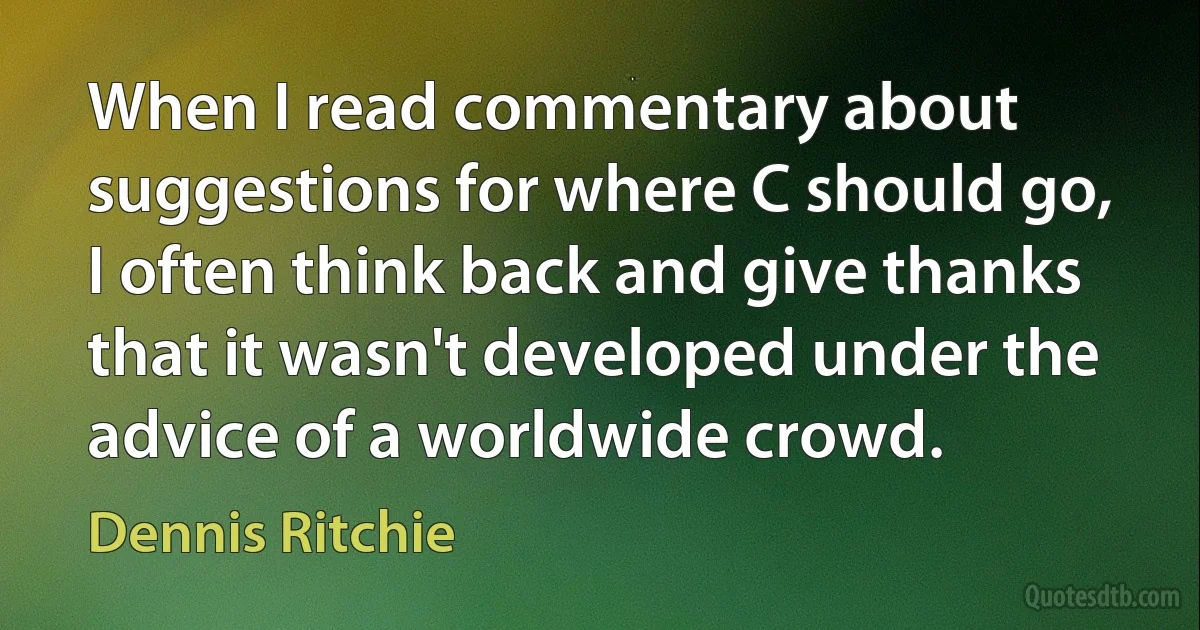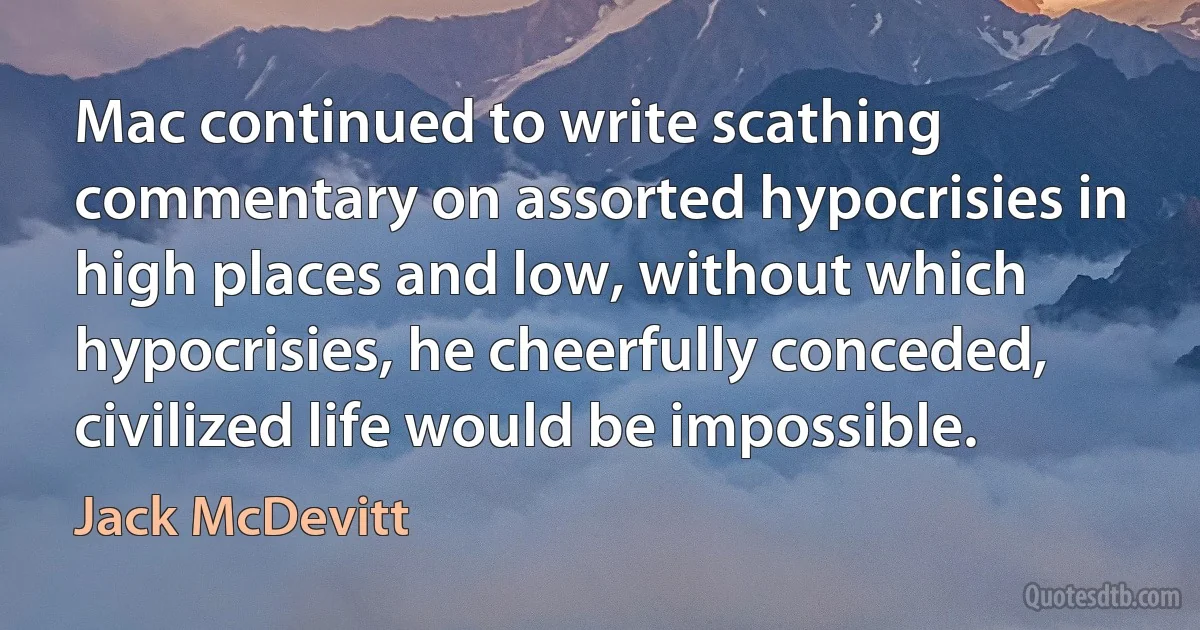Commentary Quotes - page 2
And another thing I like about cricket is, because most of the commentators apart from Boycott and Trueman are very old-worldly, they have an innocence and naïveté about them, that makes them sometimes say, in the course of their commentary, inadvertently rude things: 'Now we're at the start of play, and we're coming in to play; and the bowler's Holding, the batman's Willey'; 'Here we are, and we're about to commence play. And there's Simpson, in his usual position, standing with his legs wide open, at first slip, waiting for a tickle.

Linda Smith
...it was in her refusal to allow any of us to indulge in self-pity of any kind...through a maddening style of argument, in which the following three statements were repeated in various sequences:
A. It's your life + social commentary.
B. What you want and what you get are usually two entirely different things.
C. No one ever said that life was fair.

Nicholas Sparks
Any good broadcast, not just an Olympic broadcast, should have texture to it. It should have information, should have some history, should have something that's offbeat, quirky, humorous, and where called for it, should have journalism, and judiciously it should also have commentary. That's my ideal.

Bob Costas
The insomniac brain comes in various flavours; different personality types you're forced to share your skull with for several hours. It's like being trapped in a lift with someone who won't shut up. Sometimes your companion is a peppy irritant who passes the time by humming half- remembered TV theme tunes until 7am. Other times it's a morose critic who has recently compiled a 1,500-page report on your innumerable failings and wants to run over it with you a few times before going to print. Worst of all is the hyper-aware sportscaster who offers an uninterrupted commentary describing which bits of your body are currently the least comfortable. No matter where you put that leg, he won't be satisfied. And he's convinced you've got one arm too many.

Charlie Brooker
There are some programs on FOX that are not only fair and balanced, they're commentary shows. They don't have to be. But they brag about how fair and balanced they are. They don't cover rallies and tea parties. They cheer lead for rallies and tea parties. And as a journalist, I am totally against that.

Bernard Goldberg
I had thought, seeing how bitter is that wind
That shakes the shutter, to have brought to mind
All those that manhood tried, or childhood loved
Or boyish intellect approved,
With some appropriate commentary on each;
Until imagination brought
A fitter welcome; but a thought
Of that late death took all my heart for speech.

William Butler Yeats
Any form of card-case, beyond the most battered and unassuming, is surely an aesthetic and social travesty. To withdraw, say, a silver case from the pocket before removing a card is surely to trumpet a ludicrous gaucheness and maladroit pretension. It is impossible for the intended recipient of the card to view the case as anything other than a misjudged piece of peacockery; unfeasible to avoid a brief inner commentary along the lines of oh, he's bought one of those... he decided this would make the act of handing over a card a signal of his success as a businessman and a certain refined elegance as a gentleman... probably picked it out himself... please God it was a Father's Day gift from a child who knew no better.

Derren Brown
One thing I will say is Joe Rogan's commentary was a little off during the fight. The ground game was pretty even in my book with Shields doing a little more controlling. Kampmann escaped to his feet several times and Kampmann had more submission attempts than Shields had, but listening to Rogan, you would have thought Shield had submitted him the first ten seconds of being on the ground. I really think the UFC could use a third man doing the broadcast, that has some experience inside the octagon. I don't disagree with everything Rogan says, but there are a lot of things he says that I just laugh at.

Matt Hughes
The ideal "Life of Jesus" [biography] at the close of the nineteenth century is the "Life" which Heinrich Julius Holtzmann did not write - but which can be pieced together from his commentary on the synoptic gospels and his new testament theology. It is ideal because, for one thing, it is unwritten, and arises only in the idea of the reader by the aid of his own imagination, and, for another, because it is traced only in the most general outline.

Albert Schweitzer
And as for the close connection between philosophy and poetry, we can refer to a little-known statement by Thomas Aquinas in his Commentary on Aristotle's Metaphysics [I, 3]: the Philosopher is akin to the Poet in this, that both are concerned with the mirandum, the "wondrous," the astonishing, or whatever calls for astonishment or wonder. This statement is not that easy to fathom, since Thomas, like Aristotle, was a very sober thinker, completely opposed to any Romantic confusion of properly distinct realms. But on the basis of their common orientation towards the "wonderful" (the mirandum - something not to be found in the world of work!) - on this basis, then, of this common transcending-power, the philosophical act is related to the "wonderful," is in fact more closely related to it than to the exact, special sciences; to this point we shall return.

Josef Pieper
Learned commentaries I have found to store the head with many notions, and often also with the truth of God; but when the Spirit teaches, through the instrumentality of prayer and meditation, the heart is affected. The former kind of knowledge generally puffs up, and is often renounced, when another commentary gives a different opinion, and often also is found good for nothing, when it is to be carried out into practice. The latter kind of knowledge generally humbles, gives joy, leads us nearer to God, and is not easily reasoned away; and having been obtained from God, and thus having entered into the heart, and become our own, is also generally carried out. If the inquirer after truth does not understand the Hebrew and Greek languages, so as to be able to compare the common translation with the original, he may, concerning several passages, get light by an improved rendering, provided he can be sure that the translator was a truly spiritual person.

George Müller
I love a smart, well-written show, and '30 Rock,' well, you can't get any better than that. Tina Fey poos funny. There's nothing that she does that isn't funny. That show is an example of how brilliant she is. It's so smart. They've done some brilliant commentary about the 'Housewives' with 'Queen of Jordan,' their show-within-the-show.

Andy Cohen
But with today's mammoth papers the poor boobs have to write at ten times the length their subject is worth, and apart from over-padded news we have the curse of modern journalism, the proliferation of the commentary, the background exposition, the in-depth analysis, the "think-piece", all adding up to an indigestible stream of crap which no one wants to read, and no one, to judge by the mechanical repetition and weary rambling, wants to write either.

George MacDonald Fraser



